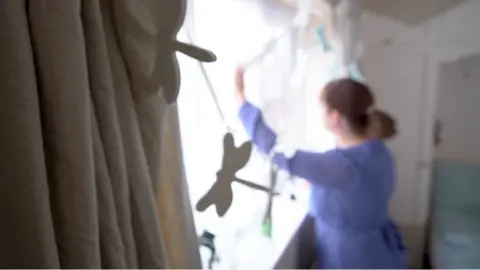Firms told to look out for domestic abuse signs
 Poike
PoikeEmployers "have a duty" to support staff who suffer domestic abuse but few have adequate policies in place, the government says.
It said bosses were in a unique position to help but a "lack of awareness and stigma" held them back.
Calls to domestic abuse services have surged in the pandemic as couples spend more time at home.
Business Minister Paul Scully said employers could be a "bridge between a worker and the support they need".
"It was once taboo to talk about mental health, but now most workplaces have well-established policies in place. We want to see the same happen for domestic abuse, but more quickly and more effectively," he said in an open letter to employers.
Managers and colleagues are often the only other people outside the home that victims talk to each day and so "uniquely placed" to spot signs of abuse, he said.
These include becoming more withdrawn than usual, sudden drops in performance, mentions of controlling or coercive behaviour in partners, or physical signs such as bruising.
Sharing the problem
Employers did not have to become "specialists" in handling domestic abuse, Mr Scully said, but could do more to help, including:
- Ensuring staff can spot the signs of a colleague facing domestic abuse so they can respond appropriately and sympathetically
- Communicating that they are there to help, and promoting information about support services
- Fostering a more open work environment where workers feel able to share problems
- And offering practical support such as space and privacy to make calls and arrangements or access to financial help.
Firms already taking action include Vodafone, which offers specialist training to HR and line managers and support for victims including counselling and additional paid leave.
In August, law firm Linklaters strengthened its policies and now offers people who need to flee their home but can't stay with others three nights' accommodation in a hotel.
It also offers the option of paid leave, plus one-off payments of £5,000 to help victims trying to become financially independent.
Domestic violence charity Refuge said it saw an 80% increase in calls to its helpline during the first national lockdown, a trend the government believes has continued.

And in November, 43% of respondents to a survey by charity Surviving Economic Abuse showed an abuser had interfered with someone's ability to work or study from home during the crisis.
Examples included hiding phones or computers, removing wi-fi connections, and phoning an employer claiming a breach of lockdown rules, in an apparent effort to get them sacked.


Domestic abuse isn't a new problem, nor does today's call to businesses apply only during a pandemic.
But coronavirus has highlighted new and existing risks.
For many victims and survivors, work is a place of respite.
Being based at home, or on furlough, can reduce communication with team members, and prevent face-to-face chats with colleagues.
I've heard of employers finding simple yet effective ways of supporting staff during the pandemic.
For example, finding a plausible reason for an employee whose remote communications were being overlooked, to go into the office as a one-off, so they could talk freely and hand over an ID document for safe keeping.
Of course, not every business can afford to offer emergency accommodation or financial support to those in urgent need. But the focus of today's letter is on awareness, using free support and removing stigma.
The charity Surviving Economic Abuse wants the government to go further, and put paid leave for domestic abuse victims into law.
Elizabeth Filkin, who chairs the Employer's Initiative on Domestic Abuse, argues there are real benefits in supporting staff - including around productivity, loyalty and reputation.

'Quiet or tearful'
Employment lawyer Sarah Chilton, a partner at CM Murray, told the BBC that all employers have a duty to protect their staff's health and safety while working from home. That includes if they are being subjected to domestic abuse.
"Where an employee is required to work at home during, for example, the pandemic, the employer should take account of any risk to that person's physical and mental health and safety in the environment in which they work."
Angela Ogilvie, global director of HR at Linklaters, said training was vital to spot signs of abuse, especially now.
"Victims may avoid calls or videos for example. They may become quiet, anxious or tearful, secretive about their home life.
"And it's being conscious of how you start those conversations because they may be overheard, so you may have to switch your conversation to email or text."
Mr Scully said the government would consult on ways to help domestic abuse victims at work, for instance by making it easier to request flexible working.
The government's Domestic Abuse Bill also continues to make its way through parliament.
It will bring into law a statutory definition of domestic abuse that includes coercive or controlling behaviour as well as emotional and economic abuse.
